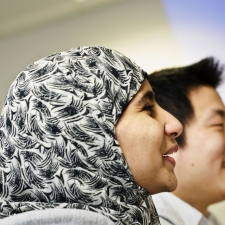Political economy roundtable: Keynes' general theory and its different interpretations
This event has taken place
View all upcoming events at Kingston University.
Time: 6.00pm - 8.00pm
Venue: Room JG1006, John Galsworthy building, Penrhyn Road campus, Penrhyn Road, Kingston upon Thames, Surrey KT1 2EE
Price:
free
Speaker(s): Victoria Chick and Engelbert Stockhammer

In the autumn of last year students of political economy at Kingston University founded a reading group to discuss Keynes' general theory of employment, interest and money. The purpose was not only to gain a deeper understanding of Keynes' key notions, such as liquidity preference, marginal efficiency of capital and effective demand, but also to compare Keynes' original contributions with various streams of contemporary Keynesianism, from the IS-LM model to New-Keynesianism and Post-Keynesianism.
For this political economy roundtable the reading group has invited Victoria Chick and Engelbert Stockhammer to discuss the central concepts of the general theory and its different interpretations. Together we want to assess which aspects of Keynes' contribution remain indispensable to an understanding of contemporary capitalism and in which ways we have to go beyond his approach.
Victoria Chick is emeritus professor of economics at University College London. She is best known for her works on Keynes' general theory and for her contributions to monetary theory and policy. She is one of the most influential Post-Keynesian economists.
Engelbert Stockhammer is professor of economics at Kingston University. He is a Post-Keynesian economist who has worked on financialisation, wage and profit-led growth regimes and the macroeconomics of unemployment.
The political economy roundtables are intended as a series of events that allow for a focused discussion of current issues in political economy. Participants will present short opinion pieces to stimulate discussion.
The political economy approach highlights the role of effective demand, institutions and social conflict in economic analysis and thereby builds on Austrian, Institutionalist, Keynesian and Marxist traditions. Economic processes are perceived to be embedded in social relations that must be analysed in the context of historical considerations, power relations and social norms. As a consequence, a broad range of methodological approaches is employed, and cooperation with other disciplines, including history, law, sociology and other social sciences, is necessary.
Find out more about the Political Economy Research Group (PERG).
For further information about this event:
Contact: Karsten Kohler
Email: k1332624@kingston.ac.uk
Directions
Directions to Room JG1006, John Galsworthy building, Penrhyn Road campus, Penrhyn Road, Kingston upon Thames, Surrey KT1 2EE:
